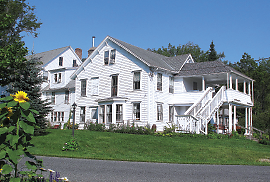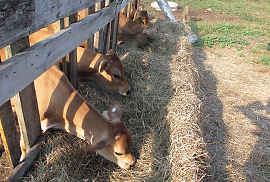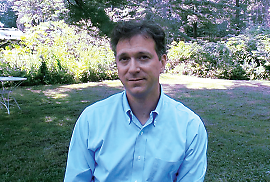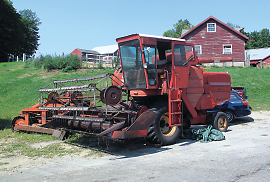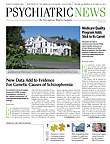Even before the fog lifts from the Berkshire Mountains in western Massachusetts, and while the air is redolent with the scent of spruce and pines, adults with severe mental illness are up for breakfast before heading out to gardens, fields, barns, and a bakery. There are cows to be milked, pigs to be fed, and vegetables to harvest and prepare for lunch.
This is the way it has been for the past 100 years—ever since Gould Farm was established by visionary social reformer William Gould and his wife, Agnes, to help those with serious mental illness.
Gould Farm is all about recovery from serious mental illness and was so long before the recovery movement became popular in psychiatry.
“I think Gould Farm is an excellent place—superb!” exclaims Jeffrey Geller, M.D., a professor of psychiatry at the University of Massachusetts and APA’s Area 1 Trustee. Geller has also had first-hand experience at the farm, trying his hand at milking cows.
The individuals who come to live and work at Gould Farm and stay for an average of nine months are referred by various sources—New York Presbyterian Hospital, McLean Hospital, the Menninger Clinic, among others. Many are college students who have had their first psychotic break or young adults who have had multiple episodes. In general they have mental illnesses with a psychotic component and have not responded fully to short-term hospital treatment.
The staff at Gould Farm works hard to make patients feel at home and get them involved. For example, they are called guests, not patients. When they arrive, they are asked, “What brought you to the farm?,” not “What mental illness do you have?,” Phyllis Vine of New York City and a member of the Gould Farm board, points out.
“They are asked to give as well as to receive,” says Donna Burkhart, acting director of Gould Farm. Burkhart has been working at Gould Farm for some 30 years, along with her husband, Wayne, who serves as agricultural director.
All the guests work, and they have job choices. “The work is very serious,” says Geller. “You are expected to answer to supervisors, follow a schedule, and there are expectations about the quality of your work.”
At the same time that guests are working on the farm, they are also living there, as are many staff members and their families. They eat meals, socialize, and go on various outings together. “The Gould Farm staff does an excellent job in creating a community that engages guests, many of whom have great difficulty in successful social interactions,” Geller notes.
While the guests are at the farm, their psychiatric needs are carefully tended to. Psychiatrist Jesse Goodman, M.D., supervises their care and their psychotropic medications. Five social workers provide a combination of supportive, cognitive, and psychodynamic therapies. A nurse dispenses the medications. All of the staff members carefully monitor the status of each guest and log their observations.
“The program relies on the old-fashioned work cure of the early part of the century, but not for morality reasons,” Goodman explains. “It is because engaging in focused learning and productive activity facilitates growth, development, independence, and improvement in symptoms.”
Robert Patterson, M.D., a psychiatrist at Harvard Medical School and McLean Hospital, served as the program’s consulting psychiatrist for many years. The farm “is part of the mainstream in thinking about pharmacologic, behavioral, and social treatment of major mental illnesses,” he states.
On Wednesday afternoons, Burkhart runs a community meeting that includes everyone—guests and staff. During the meeting, there are announcements: “There will be a ski trip on Monday,” or “We’re going to have popcorn and a movie at our house tomorrow night, and all of you are welcome to come.” Sometimes there is discussion of issues that arise in the community. And there is a custom of expressing appreciation. Tom might say, “I want to appreciate Joe; he helped me gather eggs today.” And Joe might reply, “Thanks, Dude!” And it’s not obvious to a visitor whether Tom and Joe are staff members or guests. And whenever a guest is about to leave the farm, the appreciations go on overtime, Burkhart remarks. “There are tears, laughter, encouragement—good therapy.”
Guests can also enjoy their free time at the farm. There are spontaneous music gatherings, Berkshire-area performances, Passover seders, Christmas parties, bonfires, skating, skiing, yoga, and checking out a newborn calf.
Good things often come out of guests’ stay at Gould Farm. They may make friendships that will endure after they leave. They may acquire skills that will help them get a job. One young guest got so adept at cooking that he was accepted into the Culinary Institute of America. “I was in such a bad place when I got here,” he says, “but am now so excited, hopeful, and enthusiastic!”
In 2010, Gould Farm published its first outcomes study, of 450 guests, and learned some valuable information from it. For instance, a comparison of psychiatrist-rated Global Assessments of Functioning (GAF) of the guests at the beginning and end of their treatment showed statistically significant improvements. Former guests also reported what the GAF evaluations had shown—that the farm had helped them with their mental health, physical health, family relationships, and social relationships. And when the guests were asked what had helped them the most during their farm stay, they rated friends, family, and community most highly, followed by work and staff, then by therapy, activities, and safety/structure, and finally by psychotropic medications.
So many former guests cherish their time at the farm that they attended a Gould Farm centennial reunion in August. And as someone pointed out at a Gould Farm centennial symposium in April, “Recovery is a journey of the heart—not an outcome. The goal is to become more connected to what makes us human.” ■
